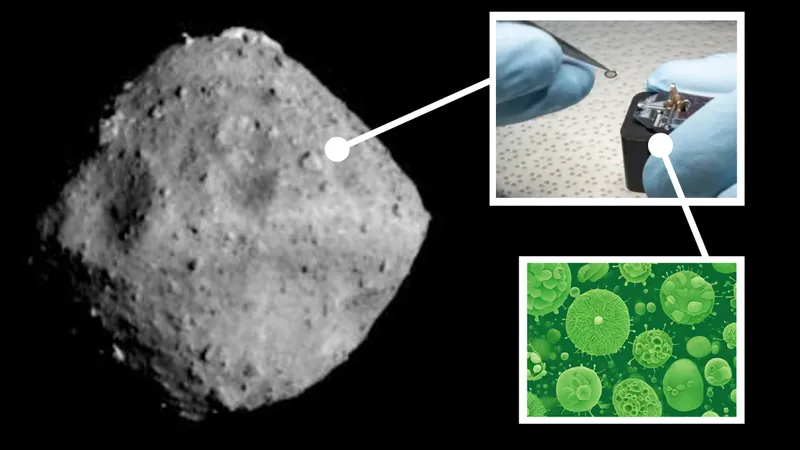
Earth's Sneaky Microbes: How Bacteria Colonized Asteroid Sample Ryugu!
2024-11-27
Author: Wei
Earth's Sneaky Microbes: How Bacteria Colonized Asteroid Sample Ryugu!
In a startling revelation, scientists have uncovered that a sample from the asteroid Ryugu, brought back to Earth by Japan's Hayabusa2 spacecraft, was rapidly colonized by terrestrial bacteria after its arrival. This groundbreaking research illustrates just how resilient and opportunistic Earth's microorganisms can be, even when presented with extraterrestrial materials.
The Hayabusa2 Mission
The Hayabusa2 mission, launched in December 2014, successfully reached the asteroid Ryugu in June 2018. Measuring approximately 900 meters in diameter, Ryugu was meticulously studied for a year. The spacecraft collected samples from the asteroid’s surface and returned them to Earth on December 6, 2020, but instead of stopping there, Hayabusa2 continued its mission to explore additional asteroids.
Microbial Colonization of Ryugu Samples
Once back on Earth, the Ryugu samples were distributed to various scientific teams. Among them, a group led by Matthew Genge from Imperial College London made an astonishing find. “We found micro-organisms in a sample returned from an asteroid,” Genge revealed. “They proliferated on the rock over time before eventually dying off.” The presence of these living microbes was confirmed by observing the change in their population, indicating they had colonized the sample shortly after its exposure to Earth’s atmosphere.
Identification of Microorganisms
Among the unexpected guests were filamentous microorganisms, although the exact type has yet to be determined. “While we cannot pinpoint their identity without DNA analysis, they are likely common bacteria, such as Bacillus, prevalent in soil and rocks,” Genge speculated.
Implications for Extraterrestrial Life Search
As humanity intensifies its search for alien life on planets like Mars, researchers confronted a crucial question: Could these microbes have existed on Ryugu prior to sample collection? The conclusion was ultimately disappointing for those yearning for extraterrestrial connections. “Before preparing the sample, we conducted extensive nano-X-ray computed tomography, and no microbes were seen,” explained Genge. “The change in population strongly suggests they emerged after the sample was exposed to Earth’s atmosphere, more than a year after its return.”
Rapid Microbial Growth
Incredibly, just within a week of their introduction to our atmosphere, these microbes multiplied from 11 to 147. Genge expressed surprise at their rapid colonization, noting that such phenomena are rare when studying meteorite specimens. “It only takes one microbial spore to initiate colonization,” he reminded.
Impact on Space Missions
This remarkable finding sidesteps the issue of uncovering alien life; however, it emphasizes the tenacity of Earth’s microorganisms and raises vital questions about the impact of space missions on other planetary bodies. "Microorganisms can effectively metabolize and thrive on extraterrestrial materials," Genge noted. “While Earth holds ample organic materials, places like Mars might rely on extraterrestrial organic inputs for supporting ecosystems.”
Planetary Protection Protocols
Perhaps most importantly, Genge highlighted the implications for planetary protection protocols among space agencies. “Our findings suggest that missions could carry the risk of contaminating other worlds. It’s essential for scientists to exercise caution regarding contamination when interpreting future extraterrestrial life findings.
Future Exploration
Looking ahead, Genge and his team are excited about studying additional samples from Ryugu and Bennu—hopefully without any more unwanted microbial hitchhikers! "We're eager to continue our exploration of these asteroids, with the hope of analyzing pristine materials next time," he concluded.
A New Era of Cosmic Exploration
Are we ready for the surprises awaiting us in the cosmos? Stay tuned as researchers dive deeper into the ultimate quest for extraterrestrial life!



 Brasil (PT)
Brasil (PT)
 Canada (EN)
Canada (EN)
 Chile (ES)
Chile (ES)
 España (ES)
España (ES)
 France (FR)
France (FR)
 Hong Kong (EN)
Hong Kong (EN)
 Italia (IT)
Italia (IT)
 日本 (JA)
日本 (JA)
 Magyarország (HU)
Magyarország (HU)
 Norge (NO)
Norge (NO)
 Polska (PL)
Polska (PL)
 Schweiz (DE)
Schweiz (DE)
 Singapore (EN)
Singapore (EN)
 Sverige (SV)
Sverige (SV)
 Suomi (FI)
Suomi (FI)
 Türkiye (TR)
Türkiye (TR)